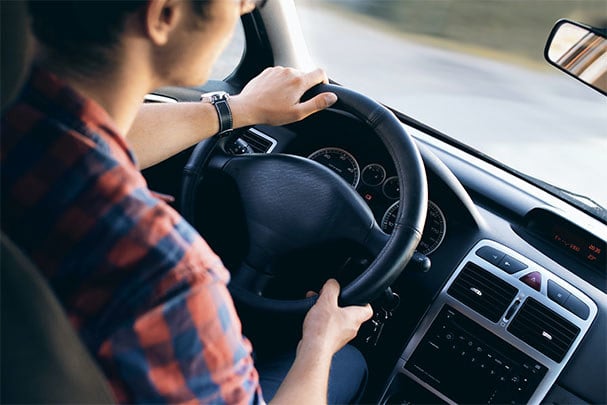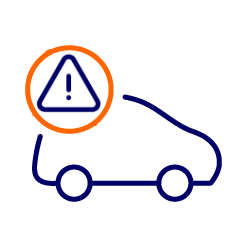
Driving isn’t always the relaxing experience we’d like it to be. Between standstill traffic, unpredictable weather, and other drivers testing your patience, it can sometimes get to you.
Whether you’re on the way to work or heading for a weekend away, the last thing you need is to arrive feeling stressed.
The good news is that it doesn’t have to be like this. With a few simple changes to your routine, your mindset, and even the car you're driving, you can reduce your stress levels while driving.
In this blog, we’ll walk you through seven practical ways to reduce stress while driving, how to deal with road rage, and how the car you’re in plays a bigger role than you might think. We discuss:

1. Find your perfect driving position
You wouldn’t sit in an office chair for hours with bad posture, so why do it in your car? A comfortable and well-adjusted seat position is one of the simplest yet most overlooked ways to reduce stress on the road.
Relax your shoulders, shake out your hands, and adjust the seat so you’re not hunched over. Experts recommend setting the seat back slightly past 90 degrees to support your spine and prevent neck or shoulder strain.
Pro tip: Every time you stop at a red light, take a moment to stretch your fingers and rotate your shoulders. It only takes a few seconds, but it helps reduce muscle tension.

2. Let music set the tone
What’s on your playlist matters more than you think. Music has a powerful effect on your mood and stress levels while driving. Upbeat music can sharpen your focus, while slow, calming tunes help to relax your mind.
Research shows that pop music is a solid middle ground. It’s not too fast, not too slow, and easy to enjoy without distraction.
Many modern lease cars come with premium sound systems and Apple CarPlay or Android Auto as standard, making it easier than ever to soundtrack your journey.

3. Use deep breathing
Deep breathing is an age-old technique that helps calm your mind. Breathe in slowly through your nose, letting your belly rise. Hold for a second or two, then exhale.
It may feel small, but deep breathing has a big impact on relieving stress.

4. Give yourself more time than needed
Running late is a stress trigger in itself, and the panic it causes can affect your focus.
If your journey normally takes 30 minutes, allow for 40. Factor in possible disruptions like traffic, roadworks, or even time to find parking.
When you add extra time into the mix, everything feels a little less frantic and you’re less likely to speed or get agitated.

5. Do you really need to drive?
Sometimes the best way to reduce stress when on the road… is to not drive at all.
If the roads are very busy, consider whether it's worth it. Could public transport get you there quicker? If the answer is yes, go for it.

6. Keep your distance from aggressive drivers
We’ve all encountered aggressive drivers, and we all know how frustrating they can be. But matching aggression with aggression is not the way to go.
Instead, stay calm and maintain a safe distance. Let them pass if needed, and don’t get drawn into tit-for-tat driving. You’re not in a Fast & Furious movie, and your wellbeing comes first.

7. Know when to take a break
Sometimes, the best solution is simply to pause. We’ve all been behind the wheel when stressed and it can undoubtedly cloud your judgement.
Pulling over to a safe spot for 5 or 10 minutes can help reset your mood, get some fresh air, and stretch your legs.
Tip: The Highway Code recommends taking a break every two hours for at least 15 minutes. Use it to stretch, grab a drink, or just breathe.
Road rage is one of the most stressful things a driver can experience. It’s almost like you lose the plot and become a completely different person.
Whether it’s caused by another person's aggressive behaviour or your own frustration, managing road rage is key to staying calm (and safe) behind the wheel.
What is road rage?
In short: it’s any aggressive or angry behaviour that happens while driving. Shouting, tailgating, excessive horn use, or even dangerous overtakes.
How to control your own road range:
- Notice the signs - Clenched fist, a racing heart - these are warning signs of anger. As soon as you spot them, take action to bring yourself back to calm.
- Pull over safety - Take a break. Even a few minutes off the road can help you reset.
- Switch the vibe - Listen to music or a podcast that puts a smile on your face. Distraction, when done safely, can change your mindset completely.
- Allow for more time - Running late is a recipe for frustration. Set off early to prevent it.
“Road rage stems from a combination of stress and lack of preparation. Building better habits, like planning ahead and staying aware of triggers can make a huge difference.”

Stressful journeys don’t have to be the norm. By making a few small changes, you can turn your driving experience into something more relaxed and enjoyable.
And when the unexpected happens, knowing how to stay calm (and spot the signs of road rage early) puts you in complete control.
Sometimes, the car itself plays a big role. A modern, well-equipped vehicle with the latest comfort and safety features can transform even the most routine journey.
Browse our latest car leasing deals and discover how upgrading your drive could be the easiest way to reduce stress behind the wheel.
Originally posted: 9th April 2021
Last updated: 10th June 2025

